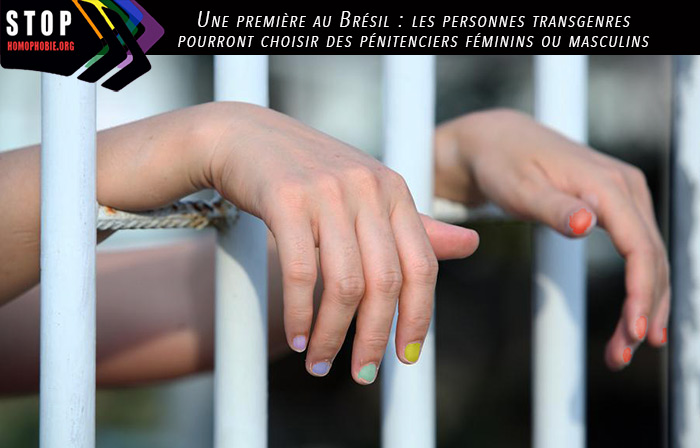>> Rio to allow transgender inmates to choose male or female prison
[spacer]
Une première : Jusqu’à présent, «travestis et personnes trans’» détenus dans les pavillons masculins étaient obligés de porter le même uniforme que les hommes et devaient rester les seins nus pendant les bains de soleil.
«C’est un traitement plus digne. Cela veut dire donner du respect à cette population», s’est félicité le secrétaire de l’administration pénitentiaire de l’État de Rio, Erir Ribeiro, cité par le quotidien O Globo samedi.
«C’est un progrès pour les droits des LGBT dans les prisons. Au cours des 30 dernières années, d’innombrables situations de discrimination ont été enregistrées», a déclaré de son côté Claudio Nascimento, directeur de l’ONG «Rio sans homophobie», lors de la signature vendredi des mesures en faveur des LGBT.
Il a expliqué, selon O Globo, que les lesbiennes resteront dans les prisons féminines «par mesure de sécurité pour éviter qu’elles ne soient victimes de viol dans les unités occupées par des hommes».
Un autre droit revendiqué depuis longtemps par les travestis et les transsexuels est garanti par les nouvelles mesures: prendre des bains de soleil sans se mettre torse nu.
Jusqu’à présent, travestis et transsexuels détenus dans les pavillons masculins étaient obligés de porter le même uniforme que les hommes et devaient rester les seins nus pendant les bains de soleil, a expliqué Claudio Nascimento au journal.
Dorénavant, ils pourront porter l’uniforme féminin s’ils le souhaitent, ainsi que des sous-vêtements féminins ou masculins et pourront garder les cheveux longs.
Ces nouvelles mesures – réclamées par les groupes de défense des LGBT depuis 2001 – vont bénéficier à quelque 700 détenus des 43 000 de tout l’État de Rio, a souligné le secrétaire Ribeiro.
«C’est une victoire des transsexuels, une population qui, en prison, devenait encore plus invisible pour la société. Maintenant, avec ces mesures pionnières de Rio, cela va changer», a affirmé la secrétaire d’assistance sociale et des droits de l’Homme, Teresa Cosentino.
avec AFP
[spacer]
>> In a first for Brazil, transgender prisoners in Rio de Janeiro will be allowed to choose whether they are jailed with male or female inmates, reports Agence-France Presse.
The new policy, approved Friday by the city’s department of prisons, is in part an effort to address physical and sexual violence faced by trans prisoners. In particular, trans women face a heightened risk of assault and rape when housed in men’s prisons — a global problem that has seen U.S. trans advocates call for policy reforms.
The move is also intended to grant trans prisoners greater « dignity, » according to Colonel Erir Ribeiro, the head of the state prison system. The new policy allows trans women who choose to be housed in men’s prison’s to wear women’s undergarments and keep their hair long, notes the AFP.
Recently, the story of incarcerated Brazilian trans woman Verônica Bolina drew attention to the fact that Brazil’s trans prisoners may be subject to discrimination and violence from prison staff and police. Bolina, who released photos to the media of her face swollen unrecognizably from an alleged beating by prison guards, sparked international outrage and a viral social media campaign using the hashtag #SomosTodosVerônica (« We Are All Verônica ») to call for justice. She remains in a São Paulo men’s prison.
Brazil has also become a hotspot in the global epidemic of fatal violence that faces transgender women, somberly memorialized during the annual Transgender Day of Remembrance. Last year’s TDOR saw a record high of 59 trans women murdered in Brazil. That strikingly high number of recorded Brazilian victims may be due, in part, to the fact that Brazilian media reports more on antitrans violence than media in many other countries worldwide.
Human rights advocates are hopeful that the change in the Rio de Janeiro prisons will spark progress throughout Brazil for such women, as well as men, who face systemic prejudice. « It’s a victory for transsexuals, a population that becomes even more invisible to society in prison, » Teresa Cosentino, the state’s head of social assistance and human rights, explained to AFP. « With these pioneering measures in Rio, that is going to change. »
In the U.S., by comparison, states vary in how they house trans prisoners according to gender, drawing lines around hormoe therapy, gender confirmation surgeries, and legal genders. Often, trans prisoners will be temporarily housed in solitary confinement to « protect » them from other prisoners. Trans advocates are pushing for an end to this practice, which is considered torturous by many, instead calling for a refocusing of efforts on violence prevention. A handful of prisons — including Los Angeles County Men’s Central Jail — have established « gay and trans » wings as a stopgap measure.


















